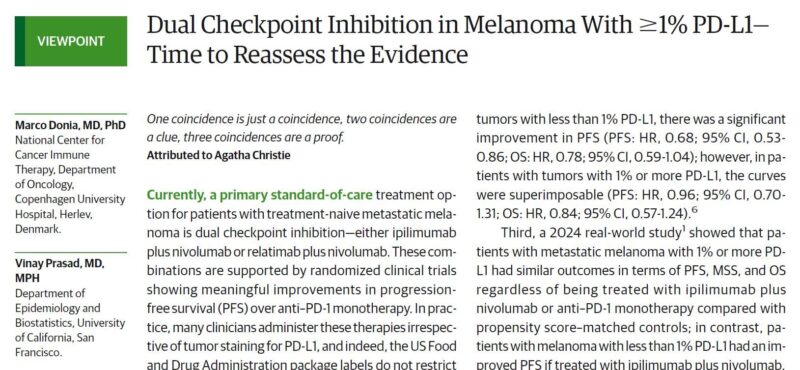
Marco Donia: The Role of PD-L1 Assessment in Dual Checkpoint Inhibition for Melanoma
Marco Donia, Clinical Research Associate Professor at the University of Copenhagen, shared on LinkedIn:
“The Role of PD-L1 Assessment in Dual Checkpoint Inhibition for Melanoma
Together with Vinay Prasad, we advocate for integrating PD-L1 assessment into treatment strategies for metastatic melanoma. This supports a more tailored approach.
Our conclusions: For the broad population of patients with PD-L1≥1% melanoma, dual checkpoint inhibition may not provide additional benefits over anti-PD-1 monotherapy and could potentially increase harm (from higher rates of serious side effects).
Evidence in support of this claim:
- Checkmate-067, Post-hoc Analysis: Shows similar long-term survival outcomes between ipilimumab/nivolumab and nivolumab monotherapy in patients with PD-L1≥1% (Details in Figure A, or page 42 of European Medicines Agency ipilimumab smPC).
- RELATIVITY-047, Protocol-defined Stratification based on PD-L1: Finds comparable survival outcomes for nivolumab/relatlimab versus nivolumab alone in patients with PD-L1≥1% (Details in Figure B, or page 92 of European Medicines Agency relatlimab+nivolumab EPAR).
- Real-World Evidence: Our 2024 study confirmed similar long-term survival outcomes between ipilimumab/nivolumab and anti-PD-1 monotherapy for patients with PD-L1≥1%, as validated via propensity-score matching (Details in Figure C on Melanoma-specific Survival MSS, or free access at European Journal of Cancer).
Moving forward: These data support PD-L1-based informed decision-making to minimize adverse effects.”

Proceed to the article.
Source: Marco Donia/LinkedIn
-
Challenging the Status Quo in Colorectal Cancer 2024
December 6-8, 2024
-
ESMO 2024 Congress
September 13-17, 2024
-
ASCO Annual Meeting
May 30 - June 4, 2024
-
Yvonne Award 2024
May 31, 2024
-
OncoThon 2024, Online
Feb. 15, 2024
-
Global Summit on War & Cancer 2023, Online
Dec. 14-16, 2023
